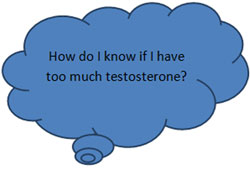Functions of Testosterone in Your Body

In its role as an androgen hormone, testosterone contributes its signals to a variety of areas that can affect bone and muscular strength, brain functions, libido, and even emotional well-being. The vast array of functions of testosterone in your body can help you age gracefully, with vitality and vigor, or make you feel as though you are wasting away at an early age.
What does testosterone do to the body that can have such a widespread effect?
As we list the functions of testosterone in the charts below, you will see how important this hormone is – not only to men but also to women.
| PHYSIOLOGICAL FUNCTIONS – BODY PART | PHYSIOLOGICAL FUNCTIONS – ROLE/EFFECTS |
| Bones | Supports new bone growth and increased bone density |
| Muscles | Improves cellular amino acid uptake and protein synthesis in muscles |
| Blood | Increase red blood cell formation in bone marrow |
| Metabolism | Impacts fat metabolism, normalizes utilization of glucose, increases lipid oxidation, aids in weight loss |
| Heart | Lowers triglyceride and LDL cholesterol levels, improves cardiac output and capacity |
| Hair | Prevents hair loss due to higher levels of DHT |
| Sexual Organs | Increases libido, supports vaginal lubrication, may increase erectile strength, supports spermatogenesis, fertility in men and women |
| MENTAL FUNCTIONS – BODY PART | MENTAL FUNCTIONS – ROLE/EFFECTS |
| Memory | Improves recall |
| Focus | Supports concentration |
| Processing | Enhances cognitive abilities |
| Plaque | Lowers beta amyloid production linked to Alzheimer’s disease |
| EMOTIONAL FUNCTIONS – BODY PART | EMOTIONAL FUNCTIONS – ROLE/EFFECTS |
| Depression | Regulation of mood, reverses feelings of depression |
| Self-esteem | Prevents negative self-image, enhances desire for socialization |
| Aggression | Deficiency – causes withdrawal, lack of motivation and drive Too much – increases aggression, agitation |
| Outlook | Creates positive outlook and feelings of well-being |
| Sleep | Prevents sleep disturbances, promotes deep sleep |
Contrary to what many believe, the main purpose of testosterone hormone is not bulging muscles or sex drive, but rather a combination of numerous crucial bodily functions. The hormone specialists at HT Medical Center help men and women maintain healthy testosterone levels throughout their lives.
Testosterone Functions for Females
Understanding the functions of testosterone in females is increasingly important as women age. Menopause is the time when testosterone production drops significantly since the ovaries stop hormone production entirely. Although the adrenals do produce a small amount of testosterone, much of this chemical undergoes conversion into estradiol which often leads to estrogen dominance and weight gain.
As we look at the functions of testosterone hormone in women at this time, we learn that testosterone can diminish the symptoms of menopause, including:
- Night sweats
- Increased belly fat
- Hot flashes
- Crying/mood swings
- Depression
- Memory loss
- Thinning hair, hair loss
- Vaginal dryness
- Low libido
The many functions of testosterone include restoration of sexual fantasies and dreams, powerful orgasms, vaginal lubrication, sharper memory, thicker hair, weight loss, and better-defined muscles.
Stronger bones and muscles are one of the most important of all reasons for women to consider testosterone replacement therapy if they have Low T. Treatment with supplemental testosterone can help reduce the risks of osteoporosis and fractures in later years.
Function of Testosterone in Males
The functions of testosterone in males go well beyond bulking up muscle mass. Yes, testosterone is excellent at increasing lean muscle, but that should never be the only reason to turn to testosterone replacement therapy. In fact, if a man is not deficient in this hormone, and he uses it anyway, he not only puts his body at risk of side effects, he also stops the natural production of testosterone – which can interfere with erectile functions and fertility.
Because the functions of testosterone hormone in males include the creation of sperm cells, testosterone therapy must be overseen by an experienced hormone specialist – especially if a man is at the stage of life when fertility is desired for conception.
Since it is the free testosterone that can bind to testosterone receptors on the tissues throughout the body, checking both free and total serum testosterone levels is important before determining treatment for Low T.
Some of the functions of free testosterone in males include:
- Preventing bone loss and strengthening bones
- Supporting weight loss and metabolism
- Promoting drive and productivity
- Maintaining a strong and toned physique
- Enhancing cognitive performance
If you are concerned about the functions of testosterone in your body and would like to learn more about testing and treatment of Low T, please contact HT Medical Center for a complimentary consultation at no charge.

















